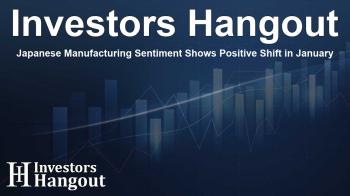Japanese Manufacturing Sentiment Shows Positive Shift in January

Japanese Manufacturing Sentiment Sees Notable Recovery
The latest insights from the manufacturing sector in Japan reveal an uplifting trend in sentiment for January. This noticeable improvement comes after a slight drop in December, with many industries experiencing more favorable conditions, especially in materials. However, uncertainty looms over future economic policies, particularly those stemming from the U.S. political landscape.
Business Confidence and Its Implications
Japanese manufacturers have reported an increase in their confidence levels, a positive sign for the Bank of Japan's (BOJ) projections of wage-driven economic growth. Intriguingly, this growth is anticipated to foster stable inflation around the desired 2% target, which bodes well for potential further interest rate hikes. The BOJ is closely monitoring these developments, as April’s upcoming policy meeting may yield key decisions based on these findings.
Details of the Reuters Tankan Poll
The Reuters Tankan poll gathered insights from 505 major non-financial firms across Japan. The data indicated that manufacturers' sentiment improved to a score of plus 2 in January, up from minus 1 in the previous month. This change marks a pivotal return to positivity after recording the first negative reading in ten months.
Sector-Specific Insights
A deeper analysis of the poll results showcased an encouraging recovery predominantly among upstream industries, notably in steel, oil refining, and chemicals. This surge can largely be attributed to a rebound in global demand. However, sectors such as machinery, particularly automobiles and electronics, experienced a decline in sentiment during January.
Outlook and Caution Among Manufacturers
Despite the recovery, manufacturers remain cautious regarding their near-term outlook. Forecasts predict that sentiment will stabilize at plus 2 come April. Even within the more optimistic sectors, various concerns have emerged. A ceramics manager highlighted potential setbacks in the automotive parts sector due to the challenges faced by Japanese automakers in international markets like China and Southeast Asia.
Concerns About Domestic Demand
Several chemical firm managers expressed worries about the persistently weak domestic demand in Japan, which could hinder broader economic recovery efforts. This sentiment aligns with concerns raised in the BOJ's December tankan survey, reflecting a mixed bag of current conditions and future uncertainties.
U.S. Policies and Their Impact
The impending shift in U.S. government policies, especially in trade, casts a shadow over manufacturers' strategies. With the inauguration of President-elect Donald Trump, many managers conveyed a sense of vulnerability regarding how international trade regulations might change. This uncertainty complicates decision-making processes across various industries.
Growth in the Service Sector
In contrast to manufacturing, the service-sector index has seen a slight uptick, rising to plus 31 this January, with expectations to hold steady through April. Increased domestic consumer confidence and a steady flow of inbound tourists have positively influenced this index. Retail sector managers emphasized the growing number of customer visits as a sign of resilience in the service industry.
Cost Management and Wage Growth
Among the construction management sector, there have been advancements in managing costs—efforts that include passing increased expenses onto service prices despite challenges posed by labor shortages. Moreover, recent data points to broadening wage hikes in Japan, contributing to the inflation rate remaining above the BOJ's 2% target. This scenario underlines the growing market sentiment around a possible interest rate hike in the near term, although consumer spending and factory output remain subdued.
Frequently Asked Questions
What drove the increase in Japanese manufacturers' sentiment in January?
The recovery is largely attributed to improved conditions in materials industries and a pickup in global demand.
How did the sentiment change compared to previous months?
Sentiment improved from minus 1 in December to plus 2 in January, marking a recovery after a decline.
What concerns do manufacturers have going forward?
Manufacturers are wary of weak domestic demand and uncertainties stemming from changes in U.S. trade policies.
Is the service sector also experiencing growth?
Yes, the service sector's index increased to plus 31, indicating a positive outlook amid high consumer confidence.
What are the implications of wage hikes in Japan?
Broad wage hikes suggest potential for a near-term interest rate hike as inflation remains above the BOJ target.
About Investors Hangout
Investors Hangout is a leading online stock forum for financial discussion and learning, offering a wide range of free tools and resources. It draws in traders of all levels, who exchange market knowledge, investigate trading tactics, and keep an eye on industry developments in real time. Featuring financial articles, stock message boards, quotes, charts, company profiles, and live news updates. Through cooperative learning and a wealth of informational resources, it helps users from novices creating their first portfolios to experts honing their techniques. Join Investors Hangout today: https://investorshangout.com/
Disclaimer: The content of this article is solely for general informational purposes only; it does not represent legal, financial, or investment advice. Investors Hangout does not offer financial advice; the author is not a licensed financial advisor. Consult a qualified advisor before making any financial or investment decisions based on this article. The author's interpretation of publicly available data shapes the opinions presented here; as a result, they should not be taken as advice to purchase, sell, or hold any securities mentioned or any other investments. The author does not guarantee the accuracy, completeness, or timeliness of any material, providing it "as is." Information and market conditions may change; past performance is not indicative of future outcomes. If any of the material offered here is inaccurate, please contact us for corrections.
